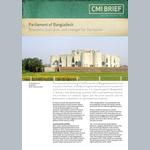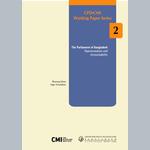Bangladesh conference: New Context and New Challenges
<div class="event-icon"></div> <span>Save this event in my Outlook calendar</span>
<div class="event-icon"></div> <span>Save this event in my Google Calendar</span>
Its 160 million inhabitants make Bangladesh the 7th most populous country in the world. The country is multi-cultural and multi-ethnic, with a Muslim majority population. The rapid change Bangladesh is undergoing presents new opportunities for human and economic development.
In the recent past Bangladesh has been able to attain impressive success in terms of GDP growth rate, poverty reduction, export orientation and achievement of many of the MDG targets. At the same time, poverty is widespread and there are serious governance problems. These must be addressed to deal with the structural and environmental challenges facing Bangladesh. Reducing poverty and improving governance require evidence-based approaches that also pay attention to the political scope for reform.
In 2010, a three-year research and capacity building programme between the Centre for Policy Dialogue (CPD), Bangladesh, and Chr. Michelsen Institute (CMI) was initiated.(http://www.cmi.no/bangladesh/; http://cpd.org.bd/html/CPD-CMI.asp). The overall objective of the programme is institutional research co-operation on issues relevant to the poor in Bangladesh, in order to support policy-relevant research and build capacity that may contribute to improved governance and inclusive growth in Bangladesh. The programme is funded by the Norwegian Ministry of Foreign Affairs (MFA)
Research findings from the first phase of this programme will be presented at the conference. International scholars have been invited to comment on the research findings. The conference is open to the public and will be held at the Resource Centre.
Programme:
09.15-09.30
Welcome: Ottar Mæstad (director CMI)
Morning Session on "Corruption, Governance and Development"
Chair: Dr. Arne Wiig, CMI
09.30-10.15
Democracy-Corruption Nexus in Bangladesh: An Economic Interpretation by Dr. Deb Bhattacharya
Discussants: Dr. Eirik G. Jansen (NORAD), Dr. Tina Søreide (CMI)
10.30-11.30
The role of the parliament in Bangladesh by Professor Rounaq Jahan (CPD, Colombia University) and Dr. Inge Amundsen (CMI)
Discussants: Professor Siri Gloppen (University of Bergen/CMI), Professor David Lewis (London School of Economics)
11.45-12.30
Democracy and corruption by Research Director Ivar Kolstad (CMI)
Discussants: Professor Arild Engelsen Ruud (University of Oslo), Professor Astrid Suhrke (CMI)
12.30-13.30 Lunch
______________
Afternoon Session on "Development of Productive Capacity and Governance Issues"
Chair: Professor Mustafizur Rahman, Executive Director, CPD
13.30 -14.15
Energy sector and FDI by Dr. Fahmida Khatun (CPD)
Discussants: Dr. Willem van der Geest (Trade Policy Advisor, EU Advisory Group) and Research Director Ivar Kolstad, CMI
14.30-15.00
Entrepreneurship and poverty: Methodological issues and preliminary findings by Dr. Khondaker Golam Moazzem (CPD) and Dr Arne Wiig (CMI)
Discussant: Dr Magnus Hatlebakk (CMI)
Concluding Remarks
15.30 -16.30
Professor Rehman Sobhan (Chairman CPD), Ambassador Ragne Birte Lund, Dr. Ottar Mæstad (Director, CMI).
__________________________
Note the lecture in the Resource Centre:
20 April 09.30-10.30
"Revisiting Bhaimara - Past and present in a village in Bangladesh"
Dr. Eirik G. Jansen
Publications

Parliament of Bangladesh: Boycotts, business, and change for the better

The Parliament of Bangladesh: Representation and Accountability
Projects

Bangladesh: Inclusive growth and good governance



